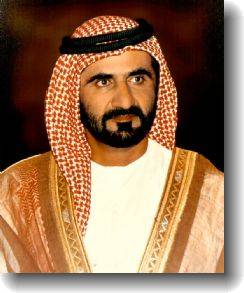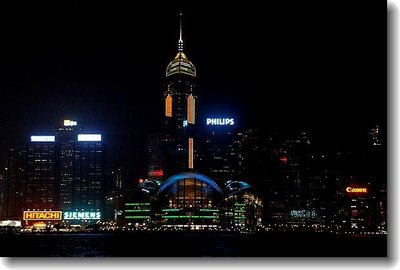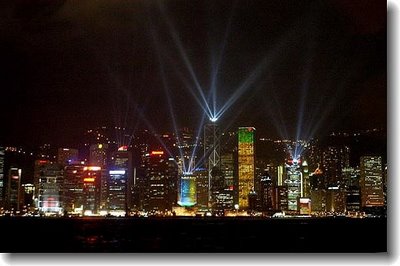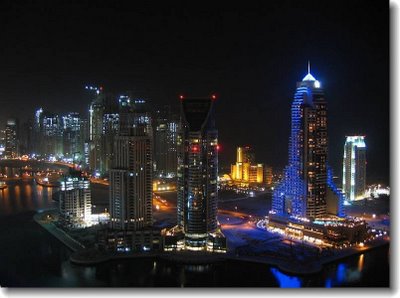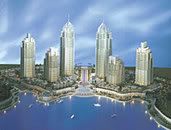Take not from the mouth of labor
Thomas Jefferson (U.S. president, 1801–1809) commented in his first inaugural address on the limited role that government should play in the lives of its citizens:
Still one thing more, fellow citizens — a wise and frugal government, which shall restrain men from injuring one another, which shall leave them otherwise free to regulate their own pursuits of industry and improvement, and shall not take from the mouth of labor the bread it has earned. This is the sum of good government, and this is necessary to close the circle of our felicities.
A topic that deserves to be visited and re-visited from time to time is the plight of the laborer in the UAE--those workmen seen in countless numbers, by whose physical exertion Dubai's towers and civil works are constructed. It is the rare few among them who are ever able to enjoy the fruit of their labor.
In Pursuit of a Better Life

Workers at Burj Dubai building site. Courtesy Tom Green.
Theirs is a story of opportunity on the one hand and exploitation on the other. There are those who travel from villages and towns in less developed countries, where there is little work or means for self-support. Some will come to Dubai and earn much more than they could back home. They might gain valuable skills and move up the employment ladder. They may in time find brothers, cousins, nephews or even sons, following in their footsteps. In the end they could return to village or town, both envied and respected.
A more common experience, however, is one of moving from hardship to hardship. It can start with having to sell one's possessions or borrow vast sums of money to secure passage to the UAE. Once in country one might suffer further under the harsh desert climate, inhumane living conditions and long working hours. Once all is said and done the reward may be little or, in some cases, there may be no earnings at all.
Who to Blame?
The aggregate experience for the laborer in the UAE is a negative one, but it is one that he enters of his own volition, perhaps compelled by family pressures or by the false promise of easy money. If there is just one out of a thousand who returns to his village a wealthy man, then surely 10,000 more will expect the same could be their fate--in spite of any evidence to the contrary.
What choices does the would-be laborer have before he leaves his homeland? Are there opportunities for earning educational or work skills which given time and effort could open up more earning potential whether at home or abroad? Are not many forgoing such opportunities in search of a quick and easy fix? How is it that one can sell the farm to pay an agent for a ticket and presumed work permit, but not make the same sacrifice to get an education or skills?
 Many a would-be laborer will come without any regard for what rules are bent in the process. Often his only concern is, "How much and to whom do I pay?" Is it any wonder that they are treated with the same lack of regard once they come.
Many a would-be laborer will come without any regard for what rules are bent in the process. Often his only concern is, "How much and to whom do I pay?" Is it any wonder that they are treated with the same lack of regard once they come.This, however, does not excuse the type and degree of exploitation that the worker faces on a daily bases. Low wages, as severe a problem as it is, is just one of many hardships a laborer must endure. The problems amount to a laundry list of issues, starting with accomodations:
- Rooms have 10 to 20 men sleeping in bunk beds.
- The room serves as dining quarters, where newspaper spread out on the floor serves as a table.
- The only recreation available is the one television per room, which the men chip in and buy.
- Two or three hundred men will make use of a cooking area with perhaps a dozen or so burners.
- The same number of men will share a dozen or so sinks, showers and toilet stalls.
- Laundry is done by hand in the same sinks or showers and strung out in the rooms, hallways or sometimes outside of the complex.
- There is no provision for privacy or personal space--no desks or tables, no chairs or lounging areas, no cupboards or wardrobes. Men use suitcases or buy or make small lockers kept under beds or attached to the wall of their bunkspace for storing personal items.
- There are no public telephones, computers or other communications facilities available.
- For cooking and other supplies there are small canteens or supermarkets in the general vicinity of the labor camps--one small store, for example, serving several thousand laborers.
- In areas where thousands to tens of thousands of laborers live there are no community or recreational facilities. There are no street lights and open spaces are left dusty and desolate.
- air-conditioners, in otherwise windowless rooms.
- electricity and running water, most of the time.
- bed space, most of the time.
- someone to clean the bath and toilet area.
- transportation to and from the worksite.
This generally constitues a working day. Fridays are off for most workers. It is during this time that they can do some extra laundry, clean their rooms, visit friends and relatives at other campsites and enjoy adhoc recreational activities.

Workers at Burj Dubai building site. Courtesy Tom Green.
An interesting question is how they, in fact, cope under such harsh conditions. First of all, they generally stick to a routine and respect each other's personal space. Cooking and cleaning after meals is shared in rotation. In this regard they partner up with other workers and purchase meal supplies in common. They cook enough for dinner to have left-overs for breakfast and lunch the next day. They subsist on very little except for the evening meal at which they consume more bread or rice. They associate with others from their village, district, state or province and country. Most purchase mobile phones and use what spare income they have to call home. Some provide services for extra income--barber services, telephone card sales, tailoring, liquor sales (illegal but common), first aid treatment (of a traditional kind), etc. Regular prayer is common among Muslims. Those of other faiths may have prayer meetings or other gatherings occasionally or at regular intervals in any bedroom where all or most share a common faith. In these and other ways, the laborers cope and manage a kind of communal existence.
Comparison of Lifestyles
From an international perspective it is rather inconscionable that properties being sold for hundreds of thousands or millions of dollars are being built with labor that is paid hourly wages that can be counted in cents. When outsiders report on the incredible spectacle of development in the UAE they often make reference to the underclass of workers involved, whose own lives could hardly contrast more with the kind of lifestyles and communities they are laboring to build.
It is in fact inherent in the capitalist system that wealth and privaledge are not equally distributed. It is a system that readily transcends borders and encourages the migration of people to places where there is more opportunity. The UAE being one such place consists of an in-country population that is easily 25% or more low-paid, contracted immigrant labor. This statistic is important for the relatively large portion of the population it accounts for, but what is even more significant is how this large segment of the population lives, in comparison to those in the middle and higher strata of society.
A comparison of wages alone reveals the vast disparity. Perhaps as many as half of the lowest paid group (the laborers) earn as little as Dhs 500 (US $136) per month for 9-10 hour days with 2-4 days off per month. The salaries and wages paid for other positions (as shown below) follow a range as indicated below (all figures tax-free):
(monthly) | ||
| *estimates based on personal observation. | ||
By this comparison, a professional can make from 10 to 30 times that of a laborer. A teacher, for example, at the lower end of the professional scale can easily earn 10 times that of a laborer. It is not unusual for a project manager on a construction site to earn Dhs 25,000 per month or 50 times that of a manual laborer at the same site.
It is not only a questoin of wages. Laborers often work in extreme weather conditions with temperatures climbing above 40˚C (104˚F), sudden gusts of blowing sand and high humidity.
Riot, Protest, Strike! ~at the Burj Dubai construction site.
Site of tallest building (u/c) in the world.
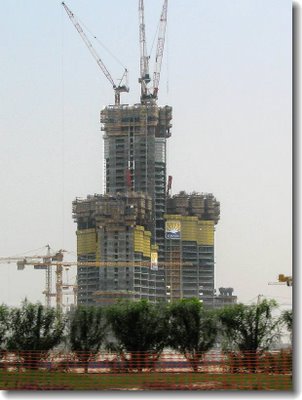 Burj Dubai (u/c) at 36 fls
Burj Dubai (u/c) at 36 flsConditions came to a head on 21 March 2006 at the construction site where 2000 to 3000 workers assemble daily. Newspaper reports described the incident variously but there was some level of violence including smashing of cars, other vehicles and site offices and equipment, causing up to $1 million in damage.
Police were called in but there were reportedly no arrests. The unrest was followed with workers returning to the worksite the following day, but refusing to work. Reportedly, the police, company officials and workers then settled their differences and resumed work the following day. They were, however, joined in a sympathy strike by the 2000 or so workers at the Dubai airport Terminal 3 construction site contracted to the same company.
- AP Wire story published at Khaleej Times online, Labour unrest hampers Burj Dubai work.
- Same wire story as above unabridged, Workers Riot at Site of Dubai Skyscraper.
- Gulf News write-up, Labourers turn violent at work site.
- Gulf News follow-up article, Not the way to seek redress.
- 7 Days report, Workers protest.
- 7 Days follow-up, Burj disruptions.
- Earlier Gulf News report on worker protests, pre-Burj Dubai incident, More workers take protest path against unpaid wages.

Workers at Burj Dubai site. Photo source: Using Doka formwork systems.
The current labor protest, however, represents perhaps an even more significant milestone in that it became violent. Furthermore, it occured at what is arguably the most prominent building site in the country. It is also significant in light of the fact that the issues of contention were much less severe than those that workers usually protest over. It appears that the main issues of contention were mis-treatment by security workers at the site and regular delays in transporting the workers back to their camp sites.
Although low wages was one of the grievances mentioned, the workers at this site are known to be paid more than the average, and in a timely fashion, and have much better living facilities than usual. Where most laborers inhabit dilapidated porta-cabins and other poorly constructed quarters, the workers of Al Naboodah Laing O’Rourke (the contractor building the Burj Dubai) are housed in newly built, well-constructed barracks with 3-4 to a room as opposed to 10-20. Theirs is one of the most sought after jobs among laborers.
This unrest was, therefore, not about the usual issue of workers not receiving salaries for months or intolerable living conditions. Why then did the protest erupt in violence? On the face of it, it is rather ironic. It appears in fact, that the uprising was more spontaneous than planned. I would speculate that there was in essence a high degree of frustruation over the transport and security issues which was ignited on account of the large numbers involved. I would surmise that this was the critical factor. What was unique in this instance was the combination of both a high level of frustration and large numbers gathered at the massive construction site. It does not represent a typical scenario.

Burj Dubai site. Photo source: Using Doka formwork systems.
The event could however become a precedent. What is worth pointing out is how news is disemminated across the UAE, and how this might influence reaction to the incident. First of all, local TV news coverage is not available to the English speaking population of the UAE, who account for half or more of the total population. News for this group is disemminated via daily newspapers, the internet and international broadcasts such as CNN and BBC. The TV news media does serve the Arabic speaking community, as their primary source for news. This being the case much of the story will be lost on the labor community who are not especially proficient on English or Arabic. The rumor mill, however, is rife, and most laborers will receive a distorted picture of events.
If nothing else, the event does continue a trend. It is not a trend toward an escalation of violence, but one where laborers become more energized about assertiing their rigths and officials become more inclined to listen to them.
See also, The Pyramid Builders at Al Sufouh Road, an exposé on workers issues with photos and links.
Petition: Read and sign a well-worded petition drafted by an investor in Dubai property, asking others (investors and interested parties) to call on the government of Dubai to look after the welfare of laborers. Also visit the associated forums at Skyscrapercity.com,
- Construction stops at Burj Dubai
- SSC PETITION FOR BETTER TREATMENT OF DUBAI CONSTRUCTION WORKERS
- UNDER C: BURJ DUBAI, 189F Mixed-Use (BDC)
TAGS: Dubai labor (Dubai labour), Dubai labor protest (Dubai labour protest), Dubai workers, Dubai property, Dubai, foreign labor (foreign labour), labor issues (labour issues), workers rights

